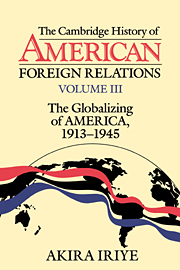Book contents
- Frontmatter
- 1 The age of European domination
- 2 The Great War and American neutrality
- 3 The United States at war
- 4 The Versailles peace
- 5 The 1920s: the security aspect
- 6 The 1920s: the economic aspect
- 7 The 1920s: the cultural aspect
- 8 The collapse of international order
- 9 Totalitarianism and the survival of democracy
- 10 The emergence of geopolitics
- 11 The road to Pearl Harbor
- 12 The global conflict
- Bibliographic Essay
- Index
- THE CAMBRIDGE HISTORY OF AMERICAN FOREIGN RELATIONS
- References
2 - The Great War and American neutrality
Published online by Cambridge University Press: 28 March 2008
- Frontmatter
- 1 The age of European domination
- 2 The Great War and American neutrality
- 3 The United States at war
- 4 The Versailles peace
- 5 The 1920s: the security aspect
- 6 The 1920s: the economic aspect
- 7 The 1920s: the cultural aspect
- 8 The collapse of international order
- 9 Totalitarianism and the survival of democracy
- 10 The emergence of geopolitics
- 11 The road to Pearl Harbor
- 12 The global conflict
- Bibliographic Essay
- Index
- THE CAMBRIDGE HISTORY OF AMERICAN FOREIGN RELATIONS
- References
Summary
The American question in the war
The coming of the Great War had little or nothing directly to do with the United States. It was a culmination of complex intra-European conflicts which had at least four dimensions: the French-German contention over Alsace-Lorraine, the Balkan crisis brought about by efforts of various nationality groups to assert their independence of the Austro-Hungarian Empire or of the Ottoman Empire, the German-British rivalry over naval expansion, and the general colonial disputes. In none of these conflicts had the United States been directly involved. Its military power had grown considerably, and it had come to possess an overseas empire. But its presence in global geopolitical affairs had been primarily confined to the Caribbean and the Pacific, even though it had developed extensive economic and ideological influences throughout the world. The very fact that war broke out in Europe without any sense of American involvement revealed that, much as the United States had begun to make itself conspicuous on the global stage, its mere existence and power alone were insufficient to prevent a major catastrophe in international affairs. As the great powers of Europe one after another mobilized for war in July 1914, and as they formally began fighting against one another in August, the United States recoiled in disbelief, incredulous that the civilized nations should thus stumble into fratricide but, all the same, relieved that at least the American people were spared the tragedy.
- Type
- Chapter
- Information
- The Cambridge History of American Foreign Relations , pp. 19 - 38Publisher: Cambridge University PressPrint publication year: 1993



